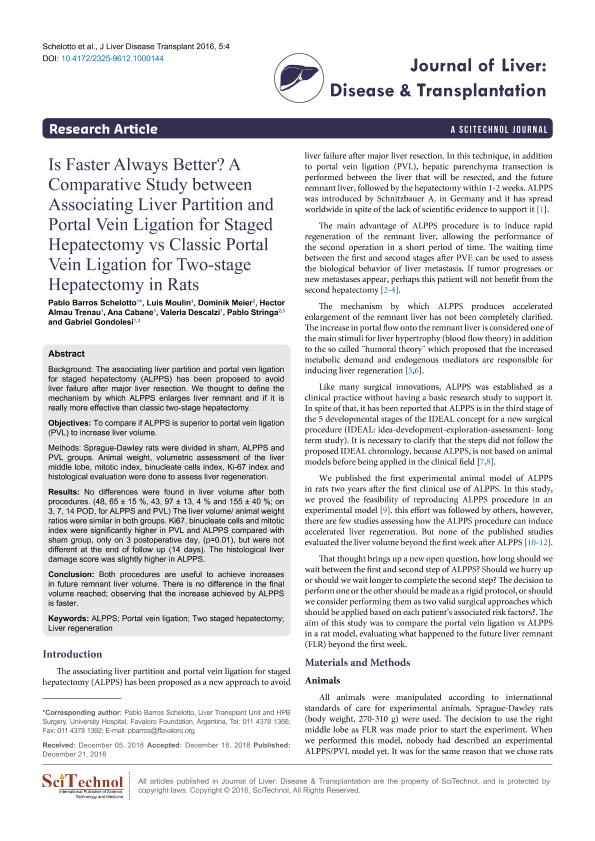Artículo
Is faster always better? A comparative study between associating liver partition and portal vein ligation for staged hepatectomy vs classic portal vein ligation for two-stage hepatectomy in rats
Barros Schelotto, Pablo; Moulin, Luis; Meier, Dominik; Almau Trenau, Hector; Cabanne, Ana; Descalzi, Valeria; Stringa, Pablo Luis ; Gondolesi, Gabriel Eduardo
; Gondolesi, Gabriel Eduardo
 ; Gondolesi, Gabriel Eduardo
; Gondolesi, Gabriel Eduardo
Fecha de publicación:
12/2016
Editorial:
SciTechnol
Revista:
Journal of Liver: Disease & Transplantation
ISSN:
2325-9612
Idioma:
Inglés
Tipo de recurso:
Artículo publicado
Clasificación temática:
Resumen
Background: The associating liver partition and portal vein ligation for staged hepatectomy (ALPPS) has been proposed to avoid liver failure after major liver resection. We thought to define the mechanism by which ALPPS enlarges liver remnant and if it is really more effective than classic two-stage hepatectomy. Objectives: To compare if ALPPS is superior to portal vein ligation (PVL) to increase liver volume. Methods: Sprague-Dawley rats were divided in sham, ALPPS and PVL groups. Animal weight, volumetric assessment of the liver middle lobe, mitotic index, binucleate cells index, Ki-67 index and histological evaluation were done to assess liver regeneration. Results: No differences were found in liver volume after both procedures. (48, 65 ± 15 %, 43, 97 ± 13, 4 % and 155 ± 40 %; on 3, 7, 14 POD, for ALPPS and PVL) The liver volume/ animal weight ratios were similar in both groups. Ki67, binucleate cells and mitotic index were significantly higher in PVL and ALPPS compared with sham group, only on 3 postoperative day, (p=0.01), but were not different at the end of follow up (14 days). The histological liver damage score was slightly higher in ALPPS. Conclusion: Both procedures are useful to achieve increases in future remnant liver volume. There is no difference in the final volume reached; observing that the increase achieved by ALPPS is faster.
Palabras clave:
Alpps
,
Portal Vein Ligation
,
Two Staged Hepatectomy
,
Liver Regeneration
Archivos asociados
Licencia
Identificadores
Colecciones
Articulos(OCA HOUSSAY)
Articulos de OFICINA DE COORDINACION ADMINISTRATIVA HOUSSAY
Articulos de OFICINA DE COORDINACION ADMINISTRATIVA HOUSSAY
Citación
Barros Schelotto, Pablo; Moulin, Luis; Meier, Dominik; Almau Trenau, Hector; Cabanne, Ana; et al.; Is faster always better? A comparative study between associating liver partition and portal vein ligation for staged hepatectomy vs classic portal vein ligation for two-stage hepatectomy in rats; SciTechnol; Journal of Liver: Disease & Transplantation; 5; 3; 12-2016; 1-6
Compartir
Altmétricas



